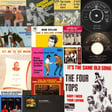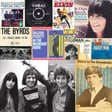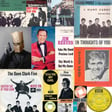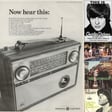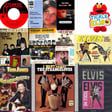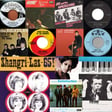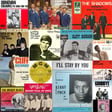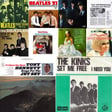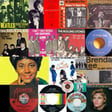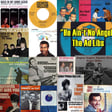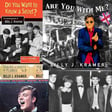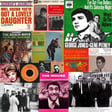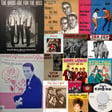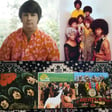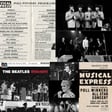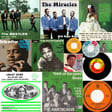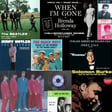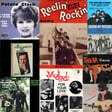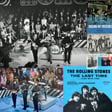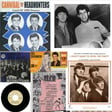Become a Creator today!Start creating today - Share your story with the world!
Start for free
00:00:00
00:00:01

October 1964 (side A)
October 1964 on the UK charts - the first two weeks of 1964. There is always something there to remind me there's a place. Our feature (guest: https://x.com/BrutalBeatles) centers on the NEMS offices in London and Whaddon house (home to Brian, George and Ringo during this era), and our usual look at the charts! Support this podcast at the $6/month level on patreon to get extra content! Create your podcast today! #madeonzencastr
Recommended
Transcript
The Beatles' Resilience and Charm
00:00:00
Speaker
The Beatles had this charm, John Paul and George, and probably then Stuart and Pete had this charm when things weren't going well, which in their world wasn't very often because mostly it was an upward trajectory, but nonetheless, sometimes, you know, they would have a bad night or the gig would, you know, it didn't work properly or the amps broke or whatever. I say, where are we going, fellas? And they'd go to the top, Johnny. And I say, where's that, fellas? And they say to the top of most of the papamos. I say, right.
00:00:30
Speaker
cheer up nothing's gonna stop us now lads we're going straight to the top the top of most of the papamos
00:00:59
Speaker
Welcome to October of 1964 here on Toppermost of the Poppermost. I'm Ed
Introduction to Brian Epstein Feature
00:01:05
Speaker
Chien. I'm Kid O'Toole. And I'm Martin Quibbell. All right. We have our feature for October, which is on Bryan Epstein because Midas Man, the film is out this month.
00:01:19
Speaker
That's right, yeah, I'm looking forward to checking it out. The interview, which unfortunately I couldn't be a part of, I was at Fabfest in Charlotte, tells a really interesting story about where he lived, where his offices were, and how they reflect on how he built not only his business empire, but also how you know he built his reputation and his confidence.
00:01:45
Speaker
Yep, so here it is for everybody listening and afterwards we'll come back and get some feedback from Kit and have a chat about it. And we are joining the interview in progress because we're trying to keep at least relatively up with where we are in 1964.
Influences on Epstein's Business Decisions
00:02:05
Speaker
Although we do start with a little bit of discussion about the Larry Parnes offices because Larry Parnes was part of why Brian shows where he would place the original Nams offices in London as you will hear. And Julie.
00:02:20
Speaker
For our feature this month, we are joined by Brutal Beatles of the There's A Place podcast. Reading from the description on Instagram, Beatles and their man-made habitat, the building's furniture, design, and ephemera that was strumming in the background. If you haven't given it a chance, look for it.
00:02:41
Speaker
um In the staid, respectable neighbourhood of Kensington, there's a nice upper-income bracket block of flats. Inside, a doormat, over which passed some rather flashy feet. The doormat belongs to Mr. Lawrence Morris Parnes, who also owns a batch of golden boys.
00:03:04
Speaker
He creates them and manages them and their money. The Larry Parnes offices, those were on Oxford Street near Argyle Street, as I remember it. Isn't that correct? Is that near where Brian would eventually set up office? I think you have to remember that Brian was, he wasn't actually all that confident despite the fact he had the biggest band in the world and he was so successful. He was still quite naive and he knew it. He was very self-conscious.
00:03:32
Speaker
He knew that this was London, it was a bit scary as a Northerner, as a Jewish person, he would have felt intimidated by the establishment and he didn't want to put a foot wrong. And so I think some of the choices he made were choices that were sort of governed by the advice he took from other people from similar backgrounds who'd made that step. So obviously Larry Parnes was from a similar background, albeit a Southern background, but he would have been influenced by that.
00:03:59
Speaker
and his choice to move into Wardenhouse I've discovered was in fact influenced by Jewish Soho entrepreneurs. I don't think Brian ever sort of stuck a pin in the map and said, here I am, let's go guys. I think it was more a case if he was cautious, he he spoke to people, he took their advice and he made these decisions very carefully.
Office Moves and Strategic Decisions
00:04:18
Speaker
So you think that Brian actually might have spoken to Larry Parnes with regards to where to choose his main offices? The Monma Street offices, obviously, were just temporary digs from the very beginning, although Brian following this careful, gee, you know, what's going to happen with the assumption that the Beatles were going to be done in six months or a year?
00:04:40
Speaker
Yeah, I think so. Either he'd have taken advice directly or he'd have followed the paths that similar people had taken and made choices based on that. That's that's my assumption.
00:04:50
Speaker
Yeah, I just find it interesting how these grooves keep getting dug in the dirt there because those offices are where the tour Scotland would have originated from. Those contracts would have been sent to the Larry Parnes offices on Oxford Street and him calling up not Brian at that point in time, but I guess Alan Williams. Yeah, I guess so. I guess it would have been Alan Williams, yeah.
00:05:15
Speaker
Nims would then move to 5 and Argyle Street, which was immediately next door to the London Palladium. Tell us a bit more about the move from Monmouth to Argyle Street. we know We've talked a bit about the Argyle Street office. It happened just because it really needed to happen and that was the point when Brian was moving the entire operation down to London.
00:05:40
Speaker
That's right. yeah He sent a memo to everybody in the Liverpool offices of a big bold statement about what this meant, um along with loads of rules about what would happen when they moved down. that you know ah Anything that happened in the NEMS office stayed in the NEMS office. It wasn't to be discussed with outsiders, but it was a very sort of he sent this ah very grand tub thumping memo to all the all the members of staff to say, you know, this is great. This is the future. Look where we are. this Isn't this wonderful? And he moved everybody down from what I really didn't pay them an awful lot. They were sort of paid on to fairly low wages for the time. um So they would have come to London with greater costs and not an awful lot more money. But I think they're all excited to do it. um And ah you know, Alistair Taylor's books got quite a bit on on this.
00:06:25
Speaker
um And when he became them's general manager, he yeah first know he got on his contract with something to do with checking the underlay at wooden house as well. So for Brian, this was you know a very exciting time and it encompassed his own sort of commitment to having to having moved to London as well.
00:06:42
Speaker
So when was it that he asked Frieda to move down? That's a famous story from good old Frieda and Frieda likes to tell the story about Brian desperately trying to get her down and her dad wouldn't let her go. i Yeah, I imagine it was around the same sort of time and and sort of March 64, but i I'm not sure, I can't be too too precise on that, but all the stuff moved down, um I think in in March of that year.
Private Office at Hilly House
00:07:07
Speaker
And the Argyle Street offices are the main ones where most of the photographs and film that we see the Beatles in the offices were to come from. They are yes, but there is another office um which I find really fascinating so I don't I can't remember how long Brian had been.
00:07:26
Speaker
In in argyle street, but he'd he'd been there a little while then realized that actually it was a little bit too crowded there were too many people there and there was too much press he wants to have his own. Private office and that's when he bought are not bought of least the fourth floor of a.
00:07:44
Speaker
a building called Hilly House on Albemarle Street in Mayfair not too far away um and there are some pictures of the Beatles in Hilly House ah from a sort of slightly later period of 66 and then 67 and they actually were in Hilly House in the office um when they decided to set up Apple Records.
00:08:07
Speaker
So is that as well as Argyle Street, or is that after Argyle? In addition to, so he, Brian felt that he needed something else that was just his. um He felt that, I mean, i I've never been inside Argyle Street, obviously, I don't know how many people have. I'm not sure what it's like inside, but I'd imagine it probably felt a little bit cramped, a little bit bustling, both outside and in. And and he he wanted to have his own private office.
00:08:32
Speaker
so that when people came to see him it felt a bit more exclusive and he had a bit more ah freedom to to see them so he tried to keep this office secret actually, he didn't tell many people about it. um It was on as i say on the fourth floor of a building on Albemarle Street in in Mayfair, um a very modern building actually. I don't know when it was built but it can't have been much earlier than about 62. It looks very modern. It's still there. um it's ah It was an airline. I think Thai Airways had it. They gave it up and I think the officers are now free and looking for people to take them on.
00:09:07
Speaker
But originally it was the Hilly Company and Hilly is spelled H-I-L-L-E. um Hilly Furniture Company that created the offices with a view to having a showroom on the ground floor to to show off their pretty fantastic modernist ah interior design chairs and so forth. um But Brian had the fourth floor and an office up there and the Beatles would frequently go there. So if there was something perhaps a bit more serious, a bit more sensitive they wanted to talk about, they could do so without worrying about any eavesdroppers at Sutherland House. It's it's almost like a Bond film where where the where the office of M is hidden above universal exports.
00:09:48
Speaker
Very much so, yeah. Yeah, it is. So another out of curiosity, how exactly did they end up at the Hammersmith Odeon then for their Christmas run? Is it the fact that they just simply could not book the London Palladium for that many dates?
00:10:04
Speaker
I'd imagine so, particularly at Christmas, it would have been in high demand and the the Hammersmith Odeon is a great venue. I've seen loads of loads of gigs there. It's um a a really superb little venue and I will ah go past it a lot ah a lot actually. I love the thought of them performing their little residency there.
00:10:25
Speaker
That's relatively far out. and We're talking five or six miles from the offices. It just, again, and it seems, gee, this is right next door to our offices. You think they would have at least tried to book some of those dates there.
00:10:38
Speaker
yeah Yeah, I've never thought about it. I don't know why they didn't. and I think your your assumption is probably right that it wouldn't be possible to get so many consecutive nights. Hammersmith is yeah it's a little bit further out. It's a bit of a journey. It's not but miles away. I suppose in the 60s, it would have felt a bit further out than it does now. It's on the A4, which is the the road that goes due west out of London to Heathrow Airport. So en route to Heathrow or London Airport, as it was called back then.
00:11:06
Speaker
um And if you carry on in a straight line, you get to Oxford um and then eventually Wales, just on that straight road due west of London. Not to steal the thunder of your show, but you know we do like to talk about the pop stars. Why don't we talk about the infamous party that Brian held?
00:11:24
Speaker
Yes, the party it wasn't house was the party. It was ah such a fabulous affair. So this was in the summer of 64, just before the US
Lavish Party Before US Tour
00:11:35
Speaker
tour. And Brian wanted the um the boys to have a really big celebration with the all the stars of the day to be assembled in one place to to celebrate would have been such a ah phenomenal ah twelve months really since its people may need to be taken off anyone to have the best party imaginable um and he hired um an interior designer called ken partridge kenneth partridge who was already
00:12:01
Speaker
in the middle of redesigning Kenwood, John's house in in Waybridge, and he got got Ken Partridge to design a marquee on top of Warden House, the block of flats where he lived, and it was a huge marquee with windows going all around the edge so you could look over London, and red and white flowers going up columns, there was a little orchestra section, there was the most amazing food,
00:12:26
Speaker
ah of of the time all sorts of wonderful food including some kosher foods for ah Harry and Queenie who were you know the guest of honor at this wonderful event it was very much Brian celebrating who he was and where he'd you know where he'd come from and what he'd achieved and he invited all of the biggest stars of the day and many of those guests you will find on the charts Obviously, Stiller was there. There was Lionel Barthes, who was very successful after the huge success of Oliver. um There were the Searchers. Two of the Stones were there. I think it was Mick and Keith. um and Then Judy Garland was the the huge guest of honor.
00:13:05
Speaker
a bit of a faux pas that happened with Judy, because she'd been invited um over dinner um the the previous night. Brian had been eating at the Caprice restaurant, which was one of his favorites, and Judy was sitting next to him. And he said, oh, you should come to this party. It's going to be fabulous. And I don't know whether he actually expected her to come, but she did. And she arrived and to find that the the bouncers on the door didn't recognize her and wouldn't let her in, because she didn't have one of the beautifully embossed ah invitations that he'd created for all the other guests.
00:13:35
Speaker
um So there was a bit of embarrassment there, but Alistair Taylor and um Tony Barrow and Ken Partridge made sure that she got in and went upstairs to enjoy the party. ah But it was it must have been an absolutely incredible affair. There's very small little block of flats with this huge marquee.
00:13:52
Speaker
on top of it would have been quite something. And my my friend Tim from Chicago, who's a wonderful artist, ah did some incredible um artwork for me to go with the YouTube versions of of the podcast, where we try to imagine what it would have looked like, this wonderful marquee on the top of Warden House. And you should definitely check out his work, Tim Coker, he's called, and his his artwork is absolutely fantastic. um But yeah, that party was was a hell of a party.
00:14:20
Speaker
and went on till four in the morning. Aleister Taylor remembers leaving with Tony Barrow. Tony was incredibly drunk and tried to drive them both home in his Mini Cooper and swerving all over the place. um And then at one point he remembers that and they just stopped and looked back and they could see this thing in the in the sky, this huge light in the sky that was still emanating from the party.
00:14:44
Speaker
And it felt like something from a Steven Spielberg, maybe that's how I was to put it. And it was was really wonderful. And I think that um for Brian, having you know spent so many years feeling like a bit of a failure, feeling like he you know he'd made the wrong choices, he'd and not been successful in the way that perhaps Harry and Queenie wanted him to be. um This was a big statement of actually, you know what, I've bloody well done it and look at what I've achieved, look at what we've all achieved together. um And isn't this a wonderful moment? And I think that um that party is really, really important. I would have loved to have spoken to Brian had he lived longer or heard from Brian if he'd lived longer to think about, to reflect on what that party meant for him and what that
00:15:27
Speaker
time in his life meant for him because everything was just ah going up and up and up and better and better and better. um And I think that after that point, you know, things would become more difficult. There would be issues which hadn't come along before. It was just the end of the age of innocence, I think was cemented in that party.
00:15:46
Speaker
I bet the neighbours must have loved that being kept to eight till four o'clock in the morning. yeah Yeah, the neighbours bloody hated the Beatles. They wrote all sorts of complaints to them. and They couldn't stand them. And they tried to kick them out at every available opportunity. and They were not impressed. I think they were very relieved when when George moved out and then and then Ringo and Brian stayed there for a few months longer. But um yeah, there are all sorts of misdemeanors happening with the Beatles, including parking in the wrong parking spots.
00:16:15
Speaker
and um attracting all sorts of unwanted attention to the street. Kind of a mirror image of what John would see years later with the Dakota. Yeah, yeah the same yeah yeah I guess you're you're very right. yeah um And then also, I mean, we've heard all those stories on Wimpole Street ah about the damage that the fans did, even if it was a relatively closed off enclave, ah the the infamous Pineapple story in on the gate in front of ah the Wimpole Street address. Tell me about the Pineapple story. I can't remember this one.
00:16:48
Speaker
Uh, well, there was a, a rare sculpted pineapple on the gates outside of Wimpole street and the fans would actually end up destroying one of the two pineapples. Oh, that's fantastic. I didn't know that. And so, uh, Jane Asher's dad, Jane and Peter's dad had to go out and cast a mold off the existing pineapple in order to get a replacement made. That's brilliant.
00:17:16
Speaker
ah And then the party ended in a fashion which was kind of reminiscent of what would happen and get back on the roof. Well, yeah, this is it. It didn't occur to me until I was doing my research that actually this wasn't the first foray onto rooftops. um And perhaps there might have been some influence there when they were thinking about, you know,
00:17:37
Speaker
How can we get the band back together? How can we ever play live again and maybe sort of channeling some of that energy from the glory days? and I think that you know um They might have been drawing on some of those memories of of of when things were simpler when things were good And going on the roof might have been inspired by that time at warden house. Absolutely It didn't hurt that the airplane had just tried the same thing in New York City. Yeah, absolutely. Yeah,
Hopes and Concerns for 'Midas Man' Film
00:18:03
Speaker
that's true. Yeah, I So from what we've seen of the Midas Man movie, do you have any thoughts on that since it sounds like the ah significant chunk of research you've done to date has been on Brian and we're talking about Brian this month. um what I mean, ah the other interesting thing is the Wadden House party would have been just before his 30th birthday.
00:18:27
Speaker
That's right, yeah. so midas I'm really looking forward to seeing Midas Man. um ah All I know about it is is the very basic detail. I'm worried how they're going to fit everything into a movie, if I'm honest, you know because there's so much to talk about. I hope it's not reductive. um I'm trying to keep an open mind, but you know what it's like when you become totally besotted with the subject. um You feel very protective of it. And I would hate to see them smudge too much of those finer details, which I think are really important. um yeah I feel like I really know Brian now having having done this. ah ah The Brian I know is is very specific in my mind. And I hope that um they they're they treat him very sensitively. I'm sure they will. I'm very excited to see it. What was the second part of your question?
00:19:10
Speaker
The fact that the party was just before Brian's 30th birthday, I found that kind of interesting. Yeah, just before his 30th birthday, and he'd also written his autobiography, A Cellar Full of Noise, um and Arnold Hecht, who was the publisher, I think, um was also present at the party. The book hadn't been released.
00:19:29
Speaker
The book is ah it's going to be 60 this month as well, so it's it's having and another anniversary. So this was very much a time of ah be of a young man turning 30, hitting a milestone, taking stock of what he'd achieved and wanting to cement that somehow in ah in a book.
00:19:47
Speaker
in a party, in ah in a grand statement, which I think is a lovely thing. um it ah It speaks to me of Brian's self assurance at this point. I mean, ah he'd spent so many years ah feeling very insecure, feeling like a failure, and he would spend the next few years feeling insecure um and and a failure and of course you know it would end so tragically because of those insecurities. Whereas this is this is the point, I mean you can see it on a graph, this is the the pinnacle ah where things were all going right and he was on top of the world. um and you know He obviously had a few more months after this of ah of enjoying the people's success but really it was it wasn't too long after
00:20:30
Speaker
um after he moved out in december of 65 that things started to go very very badly in fact they started to go badly in 64 while he was at warden house because that was when he had his heart broken by diz galispie his boyfriend who took him for a ride Yeah, it's interesting that the motto of the 60s would be, don't trust anybody over 30. And while Brian was 30 at that point, and really Brian would oversee the almost the entirety non musically of the Beatles careers for the next four years.
00:21:01
Speaker
That's right, yeah. there's There are several people on the inner in the inner circle who are very much trusted as sort of um buddies, even though they're a bit older, and particularly Derek Taylor, I think, is that the obvious example, who was um older, but very much one of them.
Paul McCartney's London Experience
00:21:16
Speaker
Marv, you got any last thoughts but because we're going to have to ah leave off here shortly. Okay, I just thought it was interesting that that Paul remained, for the most part, in London, whereas the other three Beatles came out of london even despite the clamor of the ah the fans pull, decided to remain in london for a lot longer than you as well until the the the beatles finished i believe yeah i mean i guess it is pretty annoying him less than that that, The attention was there, so you know he would be the last one to to give up on on the Beatles no matter what. There was always that big part of him that that loved it, that realized that this wasn't um just a bit of fun. This was actually something huge and offered huge opportunities. um and so It doesn't surprise me that he loved being in the center of things in London. and ah you know We've obviously heard a lot about the connections he made with John Dunbar and Robert Fraser and the avant-garde scene. know
00:22:18
Speaker
ah the firsts of 66. That was important to me, wasn't going to miss out on that. um And it it played an an extremely important part in in who he became. He loved being the man about town, um as as did Brian. So you know Brian also had the opportunity to move out to the the stockbroker belt and and didn't, although Brian did buy Kingsley Hill in Sussex um later on and there were some some mad parties there with lots of acid and and all sorts of fun to be had. But you know Brian I think was very much ah committed to London as was as was Paul. I think Paul just needed that stimulation a lot more than the others and um he you know was very much in love with all of
00:22:58
Speaker
all of london and what it meant and he still is because he can still be found wandering around soho um and um you know his office of courses in soho square um he likes being in the in the thick of things and i think that's that's great uh so where are the mpl offices in relation to the argyle street offices uh very very close um soho square so uh Oxford Street runs right through the centre of London from from ah east to west and you've got Argyle Street right in the centre, just slightly south of Oxford Circus. If you go west and then also go south, you're in in the middle of Soho, this wonderful bohemian
00:23:37
Speaker
district, which was, you know, obviously huge in the fifties and sixties, the home of artists and immigrants and gays and blacks and all sorts of, you know, the most important, exciting people of the time. Um, and it's in Soho square that you can find, um, the MPL offices. And if you walk past there now and you look up, you can see in the window staring at you, the little figurine, which you can find on the cover of wings greatest hits. It's still there. You can actually see it as you walk past.
00:24:07
Speaker
Alright, well why didn don't you tell us about some of the other buildings that you're thinking about looking into in the other areas once you get this first series finished. I think my next project, I'll try and make a of dovetail with what I've done already and look at some of the buildings I touched upon in the first season and expand upon them in more detail.
00:24:29
Speaker
I've mentioned Grove in a House Hotel on Park Lane, where Bryan stayed for much of 1963, where the Beatles stayed in 1963, the night that they played the Palladium, and where they performed in December 1963 at a charity concert. um And I had the the great honor of visiting Grove and House a few weeks ago and the wonderful archivist there Claire ah shared with me a bank of documents that she holds from the time of the the Beatles visit, which was absolutely fascinating. And I've ah've got copious notes, although she wouldn't let me take photographs. And I think that will probably be featured in in series two. And I'd also like to look at the other Park Lane hotels as well, because there's a ah you know there are stories attached to all of them. um
00:25:16
Speaker
wow this is Grosvenor House and then I mean if you don't know Park Lane it's just a street of hotels and you've got Grosvenor House and then the next one is the Dorchester and there's tons of people stories about the Dorchester and then you've got the Hilton which is where they met Maharishi and then there's what was called the Inn on the Park was another four seasons where John went to have primal therapy with Arthur Janov his mansion was being refurbished he needed needed the quiet contemplation of a hotel room to scream about his mother. So yeah, all of those things might well be the focus of series two. While not completely related, a one or two off on the Stowe School I would find really fascinating. You know, after the discovery last year.
00:25:56
Speaker
Yeah, I loved that discovery. It was absolutely wonderful. I think Samira Ahmed um did a wonderful job in uncovering that and um i I would love to do that. there's There's so many places and I think this is the beauty of doing what I've started to do, that you you pick one of these places and you really dig deep. There are so many stories and so many interconnected stories to to tell. So yeah, I'm very excited about what lies ahead.
00:26:20
Speaker
Well, that's probably a good place to close because that's exactly the same thing we've found out when looking through the charts, right, Marv? That's absolutely yeah the sort of thing that we've found. ah Much like yourself, you know, initially when we were starting topper most, we thought it would be a relatively simple affair and then it the the the research has been much more than we originally thought. Absolutely. Yeah, great. Well, you're you're doing a great job, lad, so keep it up.
00:26:49
Speaker
Thank you. So where can people find your show and get hold of you?
Beatles Architecture and History
00:26:53
Speaker
It's available on all the all the main podcast platforms. It's called There's a Place. There's also a YouTube version of each one that I've i've made with images to go with it because I realized that a lot of it is quite visual. so i I've created YouTube versions of that. I've got an Instagram account, it's called brutal beetles, which is where I started, which was looking more at sort of brutalist and modernist architecture in relation to the Beatles. And I haven't given up on that. So go and have a look at me there. And thank you very much for your interest. Thank you very much for appearing with us. We'll get some comments from kiddo tool before we go into our show for this month.
00:27:30
Speaker
Kit, what did you think about these clips? Have you heard brutal Beatles podcast? No, I hadn't. Uh, and it was really interesting to learn about it. And I'll tell you, this was a really interesting interview, not only about the buildings themselves, but also just how the buildings reflect b Brian's personal journey.
00:27:56
Speaker
about how he developed from somebody who was really trying to find his way personally and professionally and how he kind of carefully selected where he was living, where he was working, and and how he gradually built up his business empire, and how they reflected on his identity, how he was trying to prove him to himself and and to his parents, his friends, that he was a success, you know that he could be a success. I thought that was one of the fascinating parts
00:28:36
Speaker
of the interview. Wadden House, that's something which I had only ever tangentially thought about, but to imagine Brian and George and Ringo living basically under the same roof. The Wadden House section was really interesting to me, yeah, that they were all living there and apparently ah their neighbors weren't always too happy about that living arrangement.
00:29:02
Speaker
ah But Jicarly, obviously, when Beatlemania was at its peak, yeah I guess I could imagine that, that the neighbors weren't ah always too happy with the crowds and some of the partying going on. Although celebrities that showed up for that party as well. Oh my gosh, the party.
00:29:20
Speaker
That was probably my favorite part of the interview. Just the thought of that party. The creme de la creme of London celebrity at the time. And Judy Garland. Throwing in Judy Garland and into this mix and now she was almost turned away at the door. I mean, wow. Can't you imagine?
00:29:46
Speaker
how important this party was to Brian, to really show himself and to everyone, you know, this was the peak of of his professional and personal life that he had made it, you know, and getting the top interior designer and then the marquee. And they talked about the marquee. Can you imagine what that looked like? Oh, the food and the and the orchestra. They'd eat a small orchestra there.
00:30:15
Speaker
For the live music, I liked how Jim put it, that he said it was the last bit of, I think he said, innocence before things started going a bit crazy for Brian. But this was sort of the the peak of his life in a way, saying, you know, I've made it.
00:30:34
Speaker
You know what you just said, Kit, and in know in a way, I wish I'd have thought about this when we were talking with Jim, but that's exactly what you were saying there about Brian getting the the people there to decorate and to to make it you know look exactly right and have that aesthetic look and vibe to it.
00:30:51
Speaker
It sort of makes me think actually and I'd never thought about this when we were talking about it and I would if I had I'd have mentioned it but you can almost see a correlation there between the way that Brian used to look at things aesthetically and the way that Paul and John were always intrigued by the visual as well as the sonic Yeah, that's an interesting connection. I think Brian was very interested in the visual and the presentation as well. I mean i think that whole image of the party, i mean I love how Jim talked about Alistair Taylor talking about it. I mean, it's it's a shame he's no longer with us because I'd love to hear more. He talked about it in his book. but
00:31:35
Speaker
you know, love to interview him to hear more about how he said it was like something out of Steven Spielberg. I think he said that the lights and all that lights and everything. I mean, it's so almost like the great Gatsby. Brian obviously wanted to make a big impression to everyone saying, you know, I've made it. And also, I think to the guests, I mean, not just about himself, but I think also saying, you know, the Beatles are at the top of the world as well.
00:32:02
Speaker
What a moment that must have been. Yeah. The amusing thing about that is John Lennon and Judy Garland were not on the best of terms at that point in time. There are stories about John, well, making some untoward comments toward Judy Garland when they were together on the night of a hundred stars, which was right around the same point in time.
00:32:26
Speaker
Oh, really? Yes. We will leave that as an exercise for the listener to look up. But yes, security had to keep them apart backstage. Awkward. So so when when Judy Garland showed up and wasn't allowed upstairs, there must have been something going on. My goodness. Oh my gosh. And if you listen to the full story over on the There's a Place podcast, ah it ends in a way rather suspiciously like get back on the rooftop. The police were on their way up and they kept trying to go up the elevator to stop the party and Brian managed to ah placate them.
00:33:09
Speaker
Wow. That's a so yeah. Didn't the party go on until like four in the morning, four in the morning. But before then, but somewhere between midnight and 1am, the police actually showed up downstairs. And so they had to a delay the police and then be Brian sent a couple of bottles of champagne down. and Ah, Brian. I could absolutely see that. I think Brian was very diplomatic, but you know, very smooth. He makes the get back connection, but there's even more get back connections in there. So yeah, listen to there's a place season one, and he said he is going to do an addendum to season one, which sort of wraps up the rest of these stories about Brian and Wadden House and at least some about the offices. Oh, fantastic. I look forward to that.
00:34:01
Speaker
All right, and we're going to go into the charts for the British side right now. We are into the British charts for October of 1964, starting the week of October the first through the seventh. At number one is Herman's, Herman's with I'm into something good, which moved from number one to number two to number two to number five. At number two is ragdoll by the four seasons, which moved from number two to number four to number five to number 12.
00:34:31
Speaker
At number three is Where Did Our Love Go? by the Supremes, which stayed at number three for three weeks, then moved to number four. At number four is O Pretty Woman by Roy Orbison, which moved from number four to two weeks at the top spot to number two. At number nine is Marianne Faithful's As Tears Go By, moving down from nine to twelve to fifteen to nineteen.
00:34:54
Speaker
at number ten is you really got me by the kinks moving down from ten to sixteen to twenty to twenty six now we're going to switch it up a little bit this month we had so much fun with everybody reading we're gonna do the same on a regular basis now All right. So that means I'm up next. So at number 11, we have Together by PJ Proby, who's become kind of a mainstay on our show um for a while now. Maybe he's going to take Frank's place. Maybe. yeah Who knows? He's starting to be a contender. So he's at number 11 to 14 to 16. Number 12, Everybody Loves Somebody by Gene Martin.
00:35:35
Speaker
Number 11 to 13 to 17. Number 14, she's not there by the zombies, one of our favorites. 20 to 27 to 45. 16, when you walk in the room by the searchers, 9 to 7 to 3. 18, is it true by Brenda Lee, one of my personal favorites. Two weeks at number 18, in fact. 22 to 28. And number 20, we're through by the hollies.
00:36:03
Speaker
from 14 to 9 to 8 and on to Marv. At 23 we've got Rhythm and Greens by The Shadows which will go from 23 to 25 to 30 and then we'll come out of the charts. A Hard Days Night is at 24 and then we'll go to 28 and go out of the charts. You'll hear the Beatles again very soon I'm sure. At 25 we've got It's For You by Cilla Black which will go from 25 to 39 and then come out of the charts. Then we've got We've got good old Jerry and the Pacemakers at 26 with It's Gonna Be Alright going 26 to 26 again then 33 and then coming out of the charts. 27 we've got Doo-wah-dee-dee-dee-dee by Manfred Mann going Maybe I Know by Leslie Gore which will go 28, 22, 21 and then to 20. And then 29, we've got You Never Can Tell by Chuck Berry, 29 to 38, and then out of the charts. And at 30, we've got I Should Have Known Better by The Naturals, which would go 30 to 40 to 49, and then leave the charts. So we got a bunch of songs leaving the charts this month. We have ready for some good songs coming. Yes, indeed. Or questionably about some of them.
00:37:22
Speaker
Alright, at number 31, How Soon by Henry Mancini, which moved from number 31 to 23 to 17 to 10. At number 32, it's all over now by the Stones, which moved from 32 to 35, then out of the charts, more out of the charts. At number 33, Happiness by Ken Dodd.
00:37:41
Speaker
which moved from 33 to 36 to 48 to out of the charts. At number 34 is I Get Around By The Beach Boys in its final week. And our first new song of the month, Seven Daffodils By The Mojo is at number 35, which would only be around for a couple weeks. It would move from 35 to 33 to out. The way this song is performed, it almost has an early doors feel to it. Minor keys.
00:38:45
Speaker
I really want to like it more, but I'm not sure how much I do. It's got a slow drum beat, a marching tempo. The lead vocal works well and it is kind of Jim Morrison-ish. Somehow the combination of them is just ever so slightly unappealing to me.
00:39:02
Speaker
I agree. I wanted to like this more than I did. It was first recorded by the Terriers in 1960, which was a folk group and included among its original members Alan Arkin. wow yeah They specialized in pop-tinged folk music.
00:39:20
Speaker
And when you listen to the original it was really folk i mean it had a banjo in it this version is very different i mean this has more of a mersey beat ish sound you know kinda maybe mersey be crossed with the doors yeah maybe a bit like that.
00:39:38
Speaker
Definitely, you know, piano dominant. I thought the drums were a little too dominant in this. I thought the drummer overdid it a bit. I just don't know if the makeover works. but I think maybe with the lyrics, it it may play better as a traditional folk song. Maybe that's what I didn't like about it. But as you said, ed the singer was fine. You know, the lead vocals fine. But I just think it was a little heavy handed for me in terms of the arrangement.
00:40:07
Speaker
Yeah, I'd agree with that. There's bits about it that I do like. Like I said, I like the lead singer's vocal. I like the bass work that's on it. I do think that the drums are a bit, like I said, over the top in places and they're not locking with each other that much, the bass and the drums, which yeah is a bit of a down for me as a rhythm person. But kudos to them for trying to do something different with it, which I think if a bit more energy was taken to working it up a bit more, they might actually have done something a bit better with it. I think it might have worked, but they had the other problem that there was another version that came out around a similar time that will chart very soon as well that knocks them out the ballpark really.
00:40:49
Speaker
That is a trend we have this month where we have a lot of songs which are covers of other songs which are less than a year old. Not that this song is less than a year old, but the cover versions that we do have here are just too soon after the originals in a lot of cases. Great. Yeah.
00:41:05
Speaker
at number 36, Mecha by the Cheetahs, which would move from 36 to 44 to 41, then out of the charts. This is another cover. It's horn-based. It's a fairly close cover to the Gene Pitney version, the original. I think this was meant to be kind of Coasters-esque. You know, it's got funny voices doing foreign accents, but I don't care for it.
00:41:55
Speaker
The lyrics include the line, East is East and West is West and never the twain shall meet. Of course, quoting Rudyard Kipling's The Ballad of East and West. But was John thinking of the song when he composed You Are Here? ah I don't know.
00:42:14
Speaker
Maybe not this merge. All in all, it's okay, but it's annoying. I do like the guitar solo. The Cheetahs are a Birmingham band, and we will talk about them after we get your comments on the tune. The drums were okay. I like some of the fills and rolls, particularly during the guitar solo. But otherwise, as you said, Ed, the funny voices and accents, and I say that in quotation marks, got on my nerves. very quickly, very quickly. It just got very corny. I just didn't care for it. And I guess that whole metaphor, you know, I live on the west side, she lives on the east side, was the girl's parents are forbidding the pair.
00:42:56
Speaker
to become romantically involved because of their young age. So it's Mecca, the city, most of the world is forbidden to visit. So it's this forbidden love. and I just didn't really care for this in general and the over the topness of the voices that just killed it for me. Well, as I said, Coasters gone wrong. yeah Exactly. Yeah, I'm really, really sorry, we've not got very much good to say about this. Add to that the falsetto is terrible. Yes. When he tries to almost imitate what Gene Pitney does, because Gene Pitney can get that falsetto or get that high note. And this guy does it and you can hear the strain in his voice and missing occasionally the note that he needs to be singing. You can hear the flatness every now and then it's bad.
00:43:44
Speaker
Yeah, it's one of those songs where you just when it's over, you think, oh, thank God. Yeah. And then you want a good song to follow it with. Yes. Well, thankfully, we don't have to see them because there is an ad of the cheetahs in their stage costumes at this era. Oh, boy. The cheetah jackets. That's something to see.
00:44:09
Speaker
Uh, yes. I thought there was a problem with the picture and then there isn't. They don't know what they're doing with their hair. One of them has a Pete Best style pompadour and the others have 62 beetle haircuts, but not quite.
00:44:24
Speaker
And that was, of course, part of their image. so They started out as the Echos. That's E-K-O. of apostrop p s But they wanted to have a new image to stand out from the other groups at the time. So they got the idea to have stage outfits made from a leopard print material.
00:44:44
Speaker
and that got them noticed all right and so they then went along with a name change to go with it and they became originally because their lead singer at the time was named Carl Barron and they were named Carl Barron and the Cheetahs. Unfortunately though then their original lead singer left And so they became just the cheetahs. In fact, the blade singer unexpectedly left the country to live in South Africa. Don't know why. And so that's why they became the cheetahs. Well, with the falsetto that this guy is doing, I'm surprised if they didn't call themselves Def Leppard.
00:45:22
Speaker
Oh, nicely done. So July the 5th, 1963, the Beatles must've been on a Birmingham kick because we've spoken of their later evening show, which would be the first time that Paul McCartney would meet Denny Lane because opening for them was Denny and the Diplomats in their late show. Since the Beatles were late, Denny and the Diplomats had to continue playing and they'd ran out of songs. So they played having a gila amongst others. songs. A very popular song. But the early show, their opening act was the cheetahs. Wow. The drummer from the cheetahs, Ewan Rose, commented that before the show he was hanging out with the Beatles backstage. I had taken delivery of the first kit of gold Ludwig drums in Birmingham that week
00:46:17
Speaker
and Ringo was so taken with them that he asked to use them that night. We all shared one dressing room and I still have the personally signed photograph given to me by the Beatles to this day. so That's cool. Nice. Another thing I should mention is when they were with the original lead singer and all, they were first auditioned and signed by Nori Paramore. Remember him?
00:46:44
Speaker
who obviously did not have George Martin's sense of taste. No, but by this single, I think they had been let go and were signed with another label. So Nori Paramore was not responsible for this single. At number 37, Summer is Over by our buddy, Frank Ifield, which would move from 37 to 32 to 25 to 30 on its way back out of the charts. The way Frank performs it, it feels like an Irish folk song.
00:47:19
Speaker
It's not the best treatment of a decent song. Frank's vocal is a bit weak here and he goes into a mild yodel, which is really unnecessary. The tempo he's singing at rushes the song and somewhere in the middle, they start with a backing from the pipes. Definitely not the chieftains. As it is here, it feels more than a little bit twee.
00:47:59
Speaker
I have to say there will be a few Don and Betty references in this episode because as I was listening to these songs they were sitting out on our patio listening with me and dad aka Don just shook his head as we were listening.
00:48:14
Speaker
took his head. So you're listening to this. It was hilarious. Frank Eiffel sounded fine, but yeah, the yodeling. He had to sneak in those yodels. I just didn't find it a particularly strong song. At first, I thought it was a movie theme. I looked it up. I mean, it just sounded like a wannabe movie theme. It wasn't, apparently. I couldn't find any evidence of it. Did not like that pipe solo, I agree Ed. That did not work.
00:48:40
Speaker
I would have preferred, like, an acoustic guitar solo. That would have sounded a little better. That pipe solo did sound, as you said, twee. That really just added to the sappiness. And that Tom Springfield co-wrote this. Of course, Dusty's brother. The same man who wrote, I'll never find another you and Georgie girl? Come on! I just thought it wasn't a very strong song to begin with and I didn't care for it.
00:49:05
Speaker
Dusty would actually do this song later, and while it's not a great song, even in that version, it's a much better record. I'm sure. Yeah, marching beat. I think the speeding it up is trying to be a bit more down with the kids, shall we say? ah yeah To the point that he's probably got the kids from the school next door doing the pipes by the sound of it. Maybe. Trying to make it a banger?
00:49:31
Speaker
He's made a clanger instead. and What else can you say about this? I'm glad this summer was over in this song. I think it was raining for his summer.
00:49:42
Speaker
yeah The B-side was a cover of Buddy Holly's True Love Ways, which is a little bit better, but Frank I feel doing Buddy Holly is also something that you may or may not want to experience. Wow. Yeah. So as mentioned, the two co-writers of this song were Tom Springfield and Clive Westlake. Tom Springfield, in addition to writing for The Seekers, continued as an artist after ah He and Dusty split as a sibling musical act. And in 1968, he would record an album called Sun Songs and do a terrible bossa nova cover of Here, There, and Everywhere. Oh, that sounds unfortunate. I just want to be here.
00:50:48
Speaker
It sounds like a song that shouldn't work with a bossanova. No. And it does not. like yikes Now Clive Westlake also has a beetle connection because he wrote the song How the Web Was Woven. Not the first time we're gonna have a song which sounds like it's about computers and the World Wide Web but isn't.
00:51:10
Speaker
but that's right But that record would be produced by George Harrison and George would play on the record. This was a Jackie Lomax record, which was released on Apple. And that record also has the interesting fact that Paul McCartney produced the B-side Thumb and a Ride. So both sides of the single were produced by two different Beatles. Wow. Did he have a follow up where the A-side was produced by John and the B-side produced by Ringo?
00:51:42
Speaker
Unfortunately, no. That was the only time that would ever happen. They missed that chance. So Danny Eccleston of Mojo Magazine described the recording of how the web was woven as follows, a terrific rough and ready version of ah Clive Westlake, David Mostoon, aided by Jackie Lomax's authentic country soul phrasing and the quality accompaniment by the on fire Leon Russell.
00:52:11
Speaker
Not quite a cash box review, but definitely a positive one. At number 38, no one to cry to by Ray Charles. 38 to 43 to out of the charts. At number 39, the letter by the long and the short, 39 to 49 to out. And we will remind you, this is not a cover of the box top song. We talked about it last month on the greater side.
00:52:34
Speaker
At number 41, 12 Steps to Love by Brian Poole and the Tremolos in its final week. At number 42, One Way Love by Cliff Bennett and the Rebel Rousers, which moved from 42 to 29 to 23 to 15. This is another one of those, gee, the original one was just out a few months ago.
00:52:54
Speaker
The Drifters recorded this and it was in the US charts back in June and we talked about it over on the US side. This version, it's a little bit too laid back. It might have worked better if it were rocked up a bit more, a bit too much sax.
00:53:10
Speaker
Good vocal, but again, the original is better. The backing vocals work best at the one way love, but then they do some ooze at the end, which aren't great. The drums are simple and work well. I really like the cymbal work to the bass drums, but there's not enough of the cymbals there. Yeah, I agree. I think this could have been much more of a rocked out song.
00:53:53
Speaker
I don't know if it was just me, but I thought the lead vocals were mixed a little low in parts. I thought the horns kind of overwhelmed them at times. And I agree, I didn't like the ooze at times. The one way love backing vocals um in the chorus, that was fine. But yeah, I would have liked some lead guitar at parts to differentiate from the original. And here's another Don-ism here. And I'm quoting him because I just thought this was a very good way to put it. He said, it sounded like a lot of pieces put together that didn't make much sense.
00:54:27
Speaker
And I kind of thought that was a good way of putting it because it was it was just kind of all over the place at time. And yes, absolutely. The drifters original version much better than.
00:54:38
Speaker
It was on its way to becoming a Dave Clark Five song. Without the drums that you get in the Dave Clark Five songs. Yeah. Some of the elements were on the way to that. It had that raucous Dave Clark Five in bits of it like the guitar or whatever, but nothing else went with that. And if they'd have gone the whole log with that, I think it would have worked better. Yeah. h I mean, there's supposed to be rebel rouses. Get rousing. Yeah. A few rebels.
00:55:06
Speaker
Get some guitar in there. The horns are fine, but at times they just overwhelmed and it just didn't make a lot of sense. And we've spoken of Cliff Bennett and the Rebel Rousers before. Most notably, they were with the Beatles on the 66 tour and they would record a version of Got to Get You Into My Life. But there are other Beatles connections. First off, Revolution number nine samples a bit of Cliff Bennett and the Rebel Rousers song, I'm Sorry. Wow.
00:55:33
Speaker
I didn't know that. That shocked me when you brought that up. I had no idea. So John and Paul met Cliff Bennett at the Star Club, and apparently they became friends with Cliff Bennett right around that time. Moving on from there, the Rebel Rousers would, throughout their time in the 60s, pick up a number of people that we know from Beatles-related things. Howie Casey was briefly in Cliff Bennett and the Rebel Rouser.
00:56:03
Speaker
That's cool. Well, he was all over the Mersey Beat scene, wasn't he? Just amazing. Nikki Hopkins was briefly with Cliff Bennett and the Rebel Rousers. Another one that was all over. swing in Frank Allen, the searcher's bassist was with them for a while. Yes.
00:56:21
Speaker
and probably Most notably Roy Young spent some time in Cliff Bennett and the Rebel Rousers. wow cliff bennett from cliff bennett and the rebel railers now why did you record got to catch you into my life it's a great record you nailed it have all the beetle records why that one but it was actually given to us we were touring in the bes in germany paul and john and paul came in the dressing room and said We've just written this and this will be right up your street. The rest of history really went into Abbey Road. Paul produced it and it was a... It was a gift. Yeah, it was lovely, you know. A gift from the Beatles. Because we did a lot of work with the Beatles. We toured a lot with them so they knew what sort of music we did and, you know, having the brass and everything, carrying brass. So that just fitted nicely with what we were doing. So there you are. Now you know. And that resulted in a number six single for Cliff Bennett. The B-side was their original baby each day. And we will get to that in a couple of years. Mark your calendars. Well, I mean, we're getting close. I mean, you know, we're to the end of 64. We're really only 18 months away from that. That's right. If your name's Doctor Who, you can just do a timey-wimey thing and tell us how we got on with that episode.
00:57:40
Speaker
At number 43, I didn't mean to hurt you by the Rockin' Berries. This would be the only week that this song would be in the charts. Another one that is a cover of a recent song. It's a Greenwich Berry song. The original was by the Shirelles and we saw that just a few months ago over on the US side.
00:58:05
Speaker
I'm sorry that I treated you this way
00:58:26
Speaker
this version a bit overdone the guitar solo is okay but threatens to go wrong the harmonies are almost beach boys harmonies again they threaten to go wrong not quite but almost and then that ending is just cheesy as heck
00:58:52
Speaker
Maybe the better side of meh, but not as good as what was a lesson-inspired Shirelles record. Yeah, I agree. It's like they're not only Beach Boys gone wrong, but it's like they're trying to attempt also the girl group harmonies, like the Shirelles harmonies, but really doesn't work. I just couldn't help but giggle at times. I swear that it sounded like they were saying, tweeted you this way.
00:59:26
Speaker
It's X now. ah Yeah.
00:59:31
Speaker
and I just giggled every time they said that. And I agree, cheesy ending, not a great cover to say the least. Another one of those I listened to and thought, wow, it sounds like a club band. Yeah. We've run out of songs that the audience are used to and they want us to keep playing. Oh, I know we'll play this one. They won't know it, but they'll still clap along anyway.
00:59:54
Speaker
Good call. That's about the best you're going to get out of me for this one, Ed. Yep. So do we believe what Jimmy Powell had to say about the Rockin' Berries? What he said was a couple things. First off, he says Jack Goode was auditioning for a new television show. So this would have been 6162. We went down to Aston Birmingham, the old ITV studios. However, he was more interested in soul artists back then. like Billy Fury and people like that. We had also played Support for the Beatles in Liverpool, where Brian Epstein had an interest in me as a solo artist, but I turned him down saying we'll stick together as a band. I don't know how much of that I believe, if any of it.
01:00:35
Speaker
Yeah, I don't know. This was an interesting group. ah I've heard that story too. um I've also heard that the group was originally called the Bobcats, but they later changed the name to the Rockin' Berries because they played a lot of Chuck Berry songs. An interesting aside here that's a bit spooky, believe it or not, I was actually speaking with Jack Goode's nephew earlier today.
01:01:04
Speaker
Wow. Well, there you go. So. I didn't realize that he was Jack Goode's nephew and then he was mentioning it and I said, your uncle is Jack Goode? That's so cool. I'll shout him out. He's a progressive multi-instrumentalist named John Beagley. Now, what's interesting is PJ Proby comes into the story ah about the Rockin' Berries. Believe it or not, there's a PJ Proby connection. It has to do with another song of theirs that's going to come up. He's in town and one of the
01:01:36
Speaker
members of the group, said that a talent scout talked about the group. He said that he went to see the Berries perform at the venerable Cad Berries Club in Bornville, Birmingham, and was impressed by the Rockin Berries.
01:01:52
Speaker
He became their recording manager and producer. At the time, they had a great fan following and they, of course, recorded I Didn't Mean to Hurt You. He said, I went to Birmingham to see the group and they had made an excellent demo of I Didn't Mean to Hurt You.
01:02:08
Speaker
because I couldn't find anything stronger at the time I decided to release it. And shortly after this, the publisher of the American release of He's in Town recorded by the tokens brought the song to my attention.
01:02:23
Speaker
I decided it would be really great for the berries but it would have to be recorded really quickly before the tokens record had the chance of being released the berries had one week to work it out and after we had recorded it no one could believe how good it was and supposedly then.
01:02:40
Speaker
the record company decided to promote that over. I didn't mean to hurt you. And that's why it didn't do as well. That's why but it did. chart And we will see it later this month. And actually the tokens record has been in the charts. It's final week would be the last week of September of 1964 over on the billboard charts. And it was one of those that we just had to sacrifice to time. But we'll talk a little bit about the tokens when we get to this record later on.
01:03:10
Speaker
So there you go, a little low background on the berries. And one more, not quite tangential connection between the Rockin' Berries and the Beatles. So between March and August of 1962, Rory Storm and the Hurricanes consisted of Rory Storm, Johnny Guitar, Ty Bryan, Bobby Thompson, and some guy named Ringo Starr. What happened to him?
01:03:35
Speaker
Um, I don't know. He's got a podcast about him. I think Bobby Thompson would leave Roy storm in the hurricanes and join King size Taylor in the dominoes. And then from King size Taylor, he would join Cliff Bennett and the rebel rousers. well And then a year later, he would defect from Cliff Bennett to the rock and berries in 1965. So he ties all of this together. Doesn't he? Three degrees of Bobby Thompson.
01:04:04
Speaker
Anyway, so then we've got a number 44 What Am I To You by Kenny Lynch, which will go from 44 to 48 to out of the charts. At 45 you've got the incredible Under the Boardwalk by the Drifters, which will go 45 to 47.
01:04:20
Speaker
Back to 45 and then go out of the charts. At 46 we've got 7 Daffodils, not 7 Golden Daffodils, but 7 Daffodils by the Cherokees in its final week. At 47 we've got Call Up the Groups by the Baron Knights on its final week as well.
01:04:36
Speaker
At 48 we've got that Song Tobacco Road by the Nashville Teens on its final week. Not the last time we'll be speaking of the Nashville Teens this month. At 49 we've got Move It Baby by Simon Scott on its final week. And at number 50 we've got Love's Made a Fool of You by Buddy Holly which will spend three weeks at number 50. Wow that held on. And then we'll come out of the charts after that.
01:05:01
Speaker
All right, so we move to the second week of October, 1964. At number 28 is Hard Day's Night, so it's hanging in there as well. At number 30, the 12th of Never by Cliff Richard, which would move from number 30 to number to number 13. It's a good lead vocal from Cliff. However, the strings are awfully syrupy. It's a bit croony, but I do like the guitar just enough to suggest you spin it at least once. and Yeah, I agree. And I'm not a huge fan of the song. It's just never been to my taste. There's nothing wrong with it. It's just not my style. And I agree, you know, the strings, but it's a typical arrangement of this period. So that's just the way it is. But I agree. Nice lead vocal from Cliff on this. So for that alone and the guitar, I like the guitar on it, the acoustic. So for that, and particularly for Cliff's voice, definitely worth a listen.
01:06:33
Speaker
I like the guitar, like Ed says. I like Cliff's voice very much. It's got some really nice feeling in there. The lyrics border on obvious and yeah almost a bit bland to my taste in some places. Other than the guitar and his vocal, it's just too sickly syrupy for my taste as well.
01:06:54
Speaker
As I said, typical arrangement of the period, you know, it it really is. and And the song itself, this was a big hit for Johnny Mathis. This was really ah a big song for him. And and it's not to my taste, but Cliff Richards does it well. but I like his voice on them. Yeah. I mean, we've chosen to pick between them. I'm not really sure which one to pick, Johnny Mathis or Cliff Richard. I'm not particularly fond of the song, Whoever Does It Really.
01:07:20
Speaker
There have been just an amazing number of people who've done this song. Amongst them, Elvis, Dolly Parton, Barry Manilow, Cher, Waylon Jennings, Nina Simone, Jeff Buckley, Andy Williams, Roger Whitaker, and Donnie and Marie. We've got a regular We Are The World here. Donnie and Marie again.
01:07:42
Speaker
Elvis and Bruce and Donnie and Marie keep coming up, don't they? They do. I want to hear the, uh, the Waylon Jennings version now. That could be interesting. Okay. You've convinced me. I wasn't going to do it because you didn't like the song, but here you go.
01:09:11
Speaker
I love you till the point
01:11:51
Speaker
are
01:11:59
Speaker
um Okay, at number 31, there's always something there to remind me. The Sandy Shaw version, which moved from number 31 to number 11 to number one. It's a great version of the Burt Bacharach song. We mentioned it on the American side in our supercut. Sandy Shaw, a crystal clear vocal. The guitar is great. In parts, the phrasing are slightly similar to Dionne Warwick. I like the light backing singers. The percussion is also really good. The strings are good but maybe just slightly over the top.
01:12:36
Speaker
and the piano do we know who the musicians are on this i tried to find them and i couldn't sing yep listeners if you know we'd love if you would let us know i couldn't find any information on it but can you believe sandy shaw was seventeen when she recorded this what's up and team voice. Really powerful voice, great phrasing. What can you say? This is a terrific song. Classic Backrack and David, catchy melody, memorable lyrics. You know, Backrack and David, not easy to sing. Tempo changes, weird chord changes, and she handles it definitely, and particularly for a 17-year-old. I like this version. I always thought it's it's a little over a range. I do like the percussion yeah on the piano. The you know the strings are a little over the top for me, but I do like the song. It's it's still a terrific song and great vocal on this.
01:14:04
Speaker
Interestingly, about Sandy Shaw, this song, of course, was a big hit for her and propelled her career forward. She was offered Alfie before Sola Black, ah but she declined. And of course, Sola took the offer.
01:14:19
Speaker
That's a great fact that is. How things could have been different there for Silla in a sense. Yeah, no kidding. I don't have as much of a problem with the arrangement. I quite like the arrangement by and the production by Tony Hatch. Tony Hatch would go on to be the writer of Downtown and for the Brits, like soap operas, he wrote the theme for the Australian soap neighbours and the British soap opera that most Beatles fans and solo Beatles fans would know. He wrote the theme to Crossroads, which Wings would do a cover version of on Venus and Mars. Oh, wow. I like this a lot. Her voice is brilliant. Like Ed says, I'd love to know who the musicians are on this. And I do like Tony Hatcher's piano.
01:15:05
Speaker
I've seen it suggested that it is our usual British wrecking crew, but I have seen no confirmation of that. yeah Yeah. It sounds like it's probably a Bobby Graham or a Clancatini on drums to me.
01:15:18
Speaker
oo And then we do have a Beatles connection here on the 10th of January 1969, during the get back sessions, during a run through of two of us. Paul says to the rest of the band, I want the middle eight to be a little less Sandy Shaw. I don't know what he means by that, but he did say it.
01:16:01
Speaker
it's like a rockman later and you We all know what happened about an hour later on the 10th of January. I guess George took offense at the comment and said, see you around the clubs. Oh boy. Yes. George was like, how dare you say that about Sunday?
01:16:20
Speaker
exactly ah at number 34, Wayne Fontana and the Mindbenders, covering that major Lance song.
01:16:31
Speaker
um um um um um um It moves from number 34 to number 29 to number 22. It's a nice version. It's a bit mercy beat, but it's not too much of a deviation. I kind of like it. and Not as much as the original, but I do kind of like it.
01:17:19
Speaker
It's a nice cover, very respectful toward the original. The drums, the hand claps, blue-eyed soul lead vocal. I do miss the horns, though. And as you said, Mersey beat Makeover, which is not a bad thing. Well, I'll tell you, I still love the Major Lance version way better. Love that soul. And this retains a little bit of the soul, but it's hard to top the original for me. So I have to give the edge to Major Lance on this one.
01:17:47
Speaker
Oh, I don't think there's any doubt. yeah This is definitely skinny white British kids doing soul. But for what it is, it's pretty good. I actually would love to hear George take a crack at this. You know, with that Liverpool accented vocal, that might have been kind of cool. Interesting. You know, I listened to this and I thought they've sort of made it their own. Like we both said, it's not at the level that the major Lance version was at. But then, you know,
01:18:15
Speaker
When you've got Major Lance there working with Curtis Mayfield, how can you get to that sort of standard, really? I like it, but there's one thing that niggles me about it, which is it's missing something that will become a staple of the Mindbender sound. They've not quite got their backing vocals to that level that is sort of like Proto, 10cc, Eric Stewart vocals if you get my meaning in there if they got to that level by this point those vocals would have brought this song up a lot more and made it you know like when they got to the stage of groovy kind of loving that the vocals home to that level that would have worked perfectly at this time with this song.
01:18:56
Speaker
Oh, that's a good point. That would have made a big difference with this song. At number 41, Reach Out For Me by Dionne Warwick, which moved from 41 to 28 to 23 piano par excellence. It's Dionne Warwick and Burt Bacharach. It's a bit formulaic and it is slightly better than the Lou Johnson original we heard on the US side. The vocal is what makes this song. It's a good version.
01:19:23
Speaker
Yeah, I've always liked this song. I feel like this arrangement really isn't quite up to the beauty of the song. Dionne Warwick's great. I love her vocals. I love the lyrics. Really beautiful when you listen to them and the chord changes, particularly in the chorus. I love those chord changes.
01:20:23
Speaker
Only Dionne Morwick could handle these complicated melodies and and again those chord changes. But the arrangement on this is a little over the top with drums and so forth on this. It's just a little bit of a too much of a bombastic arrangement on this. But I love her voice.
01:20:41
Speaker
Peter Jackson, I've got a job for you here because I love Dion's voice on this. It's perfect. And I really like Bert's piano on this as well. But everything else, the arrangement is just too much. And here's my shout to Peter Jackson. I want everything else to be stripped out of there. And I just want to hear that piano and Dion's vocal. Yeah, I would be down with that. Absolutely. I would love to hear that.
01:21:10
Speaker
When you listen to the lyrics, song it's it's a more delicate kind of song. And other than the piano and and her voice, the rest of it is just too much yeah know for that. It's totally inappropriate for the rest of the song. Yeah. Almost like there's too many instruments there and you need to pull it back. It's almost like, you know, sometimes when you get an arrangement and you've got a full big orchestra and you and and you listen and then you think,
01:21:34
Speaker
you know that would be better if you just had a 12-piece orchestra rather than a 36-piece orchestra. It's like that, just pull it back because it's just too delicate and too sensitive of a lyric and ah and ah and a vocal and a melody for that to take over the song, essentially, and you'd lose what's there by the overblown-ness of the arrangement. yeahp I mean, it's a lot of the same things we've been saying about Tony Bennett and even Frank Sinatra to a certain extent, and yeah certainly some of the Motown artists that they would just take it that step too far. Yeah, exactly. Sometimes simpler is better. I encourage you to look up Olivia Newton-John's version from
01:22:49
Speaker
it really pares down the arrangement and you really get a fuller sense of the lyrics and on it really strips it down to a much simpler arrangement so you can fully appreciate the melody. Okay, at number 42, Do I Love You by the Ronettes, which would move from 42 to 35 to 47. We covered this on the US side, but we have to take the opportunity to read the cash box review again. Cashbox described this record as a pulsating, big sounding romancer that the gals and the Jack Nishi-led instrumentalists wax with money-making enthusiasm.
01:23:32
Speaker
Oh, those Cashbox writers. At number 45, Remember Walking in the Sand by the Shangri-La's, which moved from 45 to 32 to 31. We covered that on the US side. At number 46, Bye-Bye Baby by Tony Jackson and the Vibrations, which moved from 46 to 38 to 43. This song was Mary Wells' first song. Another cover,
01:23:57
Speaker
another British group's doing Motown. It's not the most original, but I do like some of it. I like this organ. However, the original is much better. Yeah, I agree.
01:24:31
Speaker
And I've been on my puzzle when I said that you were
01:24:41
Speaker
This is not bad organ, bad organs. This is okay. I can deal with this organ. Kind of a Mersey Beat sound, but I'd say second or third tier Mersey Beat. The original is definitely better with that Funk Brothers backing of sound. It's okay. I just didn't find this that memorable kind of average. Nice vocals. The organ is okay. The production is not great no at all. Tony Jackson is the ex-lead singer of The Searchers, who he felt that The Searchers weren't going in the same direction that he wanted them to, so he basically created this band and left The Searchers.
01:25:21
Speaker
Yeah, there's some interesting things about Tony Jackson and the searchers. Well, first off, Tony Jackson was from the dangle. He grew up just down the street from Ringo. Wow. So the searchers played in Liverpool's nightclubs and the beer bars of Hamburg again, like some other groups. We know. Now what Tony Jackson says is that Brian Epstein considered signing them, but he lost interest after seeing a drunken Jackson fall off the stage at the Cavern Club. so That kind of puts a different spin on Brian's supposed, Oh, the searchers of the one that got away. Oh boy. That doesn't give a good impression. Yeah.
01:26:02
Speaker
No, but then again, Brian never saw them in Hamburg when the Beatles were drinking copious amounts. That's true. So Tony Jackson was the lead singer on Sweets for My Sweet and Sugar and Spice, but not for needles and pins. He was, however, on Don't Throw Your Love Away and Love Potion number nine. So there you go. Join us for more of the British charts in part B. See you then. Take care.
01:26:45
Speaker
There was a piece in the NME, a news piece, that said that Top Rank Records, remember when Top Rank had a record label? and They introduced an LP series next week that will be called Toppamos and it's coinciding with their current advertising slogan topper most of the popper most. Yes, I thought they got it from somewhere. They saw that, they must have seen that in either the NME or record mirror or disc, record and show mirror as it was then. And they've taken it from there. They've obviously thought how stupid that is. How stupid is is one of those phrases that someone, an older person who doesn't understand teenagers comes up with a slogan that they think is gonna be the hip slogan of the month. Topper most of the popper most,
